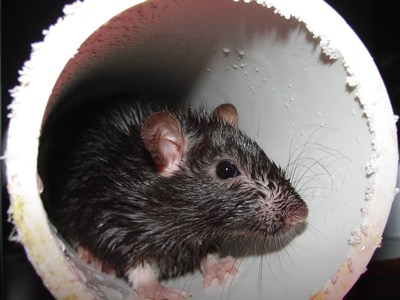Rats! Chicago Tops Orkin's Rattiest Cities List for Sixth Consecutive Time
Orkin has published its annual Top 50 Rattiest Cities List, revealing Chicago as the top city for the sixth consecutive year. The list is based on rodent treatments conducted from September 1, 2019, to August 31, 2020. Baltimore joins the Top 10 at eighth place, while San Diego climbs to 19th. Increased rodent visibility has raised concerns, particularly due to pandemic-related changes in food availability. Rodents can cause significant structural damage and health risks, making prevention crucial as colder months approach. Homeowners are advised to take proactive measures to avoid infestations.
- Orkin remains a leader in pest control, serving approximately 1.7 million clients.
- The company's partnership with the CDC enhances its credibility in pest-related health issues.
- Rising rodent populations may lead to increased treatment demand, which could strain resources.
- The visibility of rodents has heightened health concerns, raising the potential for increased liability.
Insights
Analyzing...
ATLANTA, Oct. 13, 2020 /PRNewswire/ -- Rats have taken to the streets of Chicago, yet again. Orkin released its Top 50 Rattiest Cities List today, and for the sixth consecutive time, the Windy City takes the top spot. New to the Top 10 this year is Baltimore, taking the eighth spot, and moving into the Top 20 is San Diego, rising 13 spots to secure the #19 ranking.
Orkin ranked metro regions by the number of new rodent treatments performed from September 1, 2019 to August 31, 2020. This ranking includes both residential and commercial treatments.
1. Chicago | 26. Raleigh, N.C. (-2) |
2. Los Angeles | 27. Hartford, Conn. (-2) |
3. New York | 28. Columbus, Oh (-7) |
4. Washington, D.C. | 29. Grand Rapids |
5. San Francisco | 30. Kansas City (+8) |
6. Detroit | 31. Charlotte, N.C. (-3) |
7. Philadelphia (+3) | 32. Phoenix (5) |
8. Baltimore (+4) | 33. Richmond, Va. (-3) |
9. Denver | 34. Nashville |
10. Minneapolis (-2) | 35. Greenville, S.C. (-2) |
11. Cleveland, Oh. (-4) | 36. Sacramento (+5) |
12. Seattle (+1) | 37. St. Louis (-6) |
13. Boston (+1) | 38. Albany, New York (+10) |
14. Atlanta (-3) | 39. Champaign, Ill. (-3) |
15. Indianapolis (+1) | 40. Green Bay (+18) |
16. Dallas-Fort Worth (-1) | 41. Tampa (-1) |
17. Houston | 42. Flint, Mich. (+3) |
18. Pittsburgh | 43. Buffalo, New York (-8) |
19. San Diego (+13) | 44. Syracuse (-5) |
20. Miami (-1) | 45. Knoxville (+14) |
21. New Orleans (+6) | 46. Orlando (-3) |
22. Cincinnati (+1) | 47. Burlington, Va. (+2) |
23. Portland, Or. (-1) | 48. Albuquerque (+19) |
24. Milwaukee (-4) | 49. Dayton (-2) |
25. Norfolk, Va. (+1) | 50. West Palm Beach (+3) |
In an unprecedented year, the visibility of rodents has increased, creating concern for homeowners and business owners alike. As reported in the Spring, the pandemic-driven closure of restaurants forced rodents to find new food sources. Without food waste to consume, these pests were seen scavenging new areas and exhibiting unusual or aggressive behavior. The presence of rodents became so relevant that the Centers for Disease Control and Prevention issued Rodent Control guidance on ways to keep rats and mice out of homes and businesses.
As we approach colder months, rodent activity will only continue increasing as these pests seek shelter in warm areas with available food and water. As the U.S. population spends more time at home this season, residents should pay extra attention to the attractants that entice rats and mice.
"Rodents are experts at sniffing out food and shelter, and they're resilient in their ways to obtain both," said Ben Hottel, an Orkin entomologist. "Residential properties offer the ideal habitat for rodents, and once they've settled in, they're capable of reproducing rapidly and in large quantities."
Rodents are known to cause severe structural damage with their strong jaws and burrowing skills. They have oversized front teeth for gnawing, and they have check teeth, which are adapted for chewing a variety of items, including electrical wires, water pipes and gas lines. "Unfortunately, rodents can cause great damage in and around homes," said Hottel.
Beyond structural damage, there are multiple health issues associated with rodents, and during a time of heightened awareness around virus transmission, preventing rodents and the harmful pathogens they carry is critical. Rodents are capable of contaminating food through pathogens that can cause food poisoning or Leptospirosis. They can also spread diseases such as Hantavirus and Plague, specifically in the Western U.S., both of which while uncommon, can be fatal.
The good news is, a rat infestation is preventable. To help residents avoid the potential health and safety risks associated with rodents, Orkin recommends the following tips to help prevent rats and mice in and around the home:
- Do not leave out food. Small crumbs and garbage are popular food sources, as are dry goods such as grains and cereals. These should be kept in sealed metal or glass containers to prevent contamination.
- Avoid cluttered spaces. Cardboard objects prove attractive to rodents, as they tend to chew them up for use in their nests. Take advantage of your extra time at home to clean and organize crowded spaces around the house.
- Do not let the landscaping run wild. Tall grass with adequate harborages, such as woodpiles next to the house, can be ideal habitats for rodents. Tree branches in contact with homes can also offer rodents easy access to the upper levels of your home where they may find a way into the attic.
- Inspect both inside and outside your home for rodent droppings, burrows and rub marks along baseboards and walls. The more quickly rodents are detected, the better.
- Look for possible entry points outside your home and seal cracks and holes if any are found. Install weather strips around entryways, especially under doors, to help block rodents from sneaking inside.
Using the tips above, homes across the nation can be better equipped to keep rodents out. To effectively control rodent introductions, contact a trained pest professional who can assess your situation, implement a sound solution that is designed just for your home and monitor for improvements over time.
For more information about rodent prevention, visit Orkin.com/rodents.
About Orkin, LLC
Founded in 1901, Atlanta-based Orkin is an industry leader in essential pest control services and protection against termite damage, rodents and insects. The company operates more than 400 locations with more than 8,000 employees. Through Orkin's Points of Service process – Investigate, Protect, Fortify, Keep Watch, Report and Follow Up – Orkin provides customized services to approximately 1.7 million homeowners and businesses in the United States and has nearly 100 international locations in more than 65 countries. Orkin is committed to studying pest biology and applying scientifically proven methods. The company collaborates with the Centers for Disease Control and Prevention (CDC) and eight major universities to conduct research and help educate consumers and businesses on pest-related health threats. Learn more about Orkin at Orkin.com. Orkin is a wholly-owned subsidiary of Rollins Inc. (NYSE: ROL). Follow us on Facebook, LinkedIn, YouTube and Instagram.
![]() View original content to download multimedia:http://www.prnewswire.com/news-releases/rats-chicago-tops-orkins-rattiest-cities-list-for-sixth-consecutive-time-301150702.html
View original content to download multimedia:http://www.prnewswire.com/news-releases/rats-chicago-tops-orkins-rattiest-cities-list-for-sixth-consecutive-time-301150702.html
SOURCE Orkin, LLC








